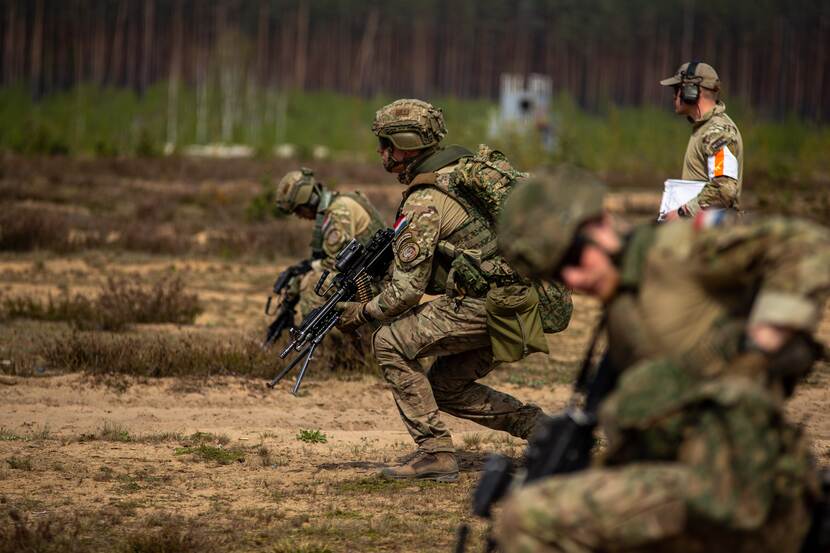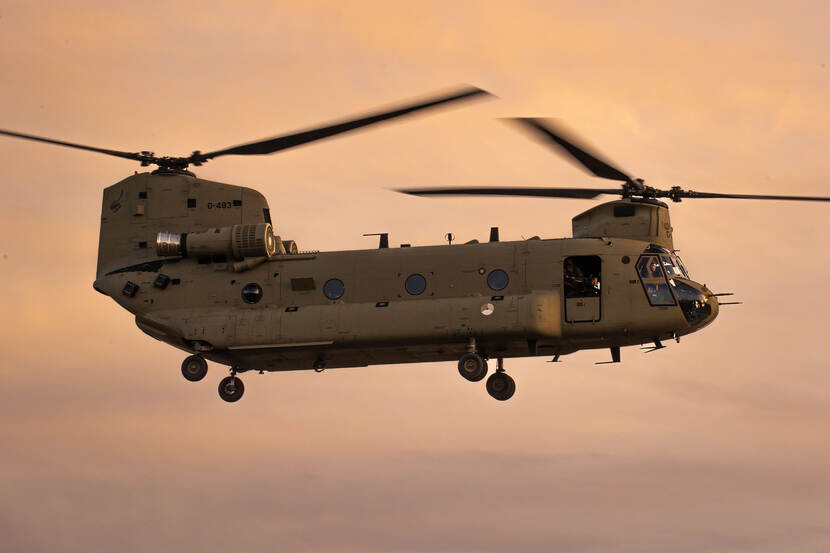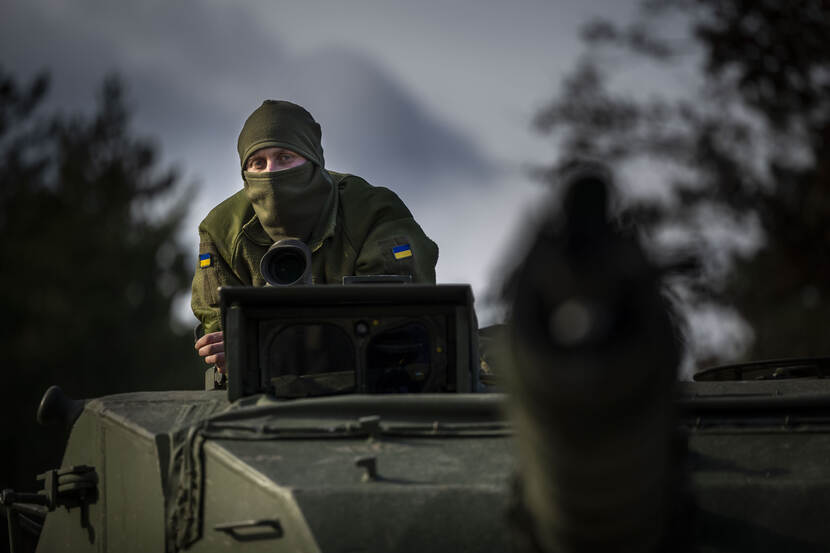
[ad_1]
News | July 8, 2024 | 12:00
A new batch of Dutch soldiers has started working in Lithuania. Together with their colleagues from Germany, Luxembourg, Norway and the Czech Republic, they will contribute to NATO’s enhanced forward presence over a six-month period. Overview of defence operations for the week of July 31 – August 6, 2024.
Enlarge the image

The Netherlands has been participating in this advanced activity in the Baltic States since 2017. The Ministry of Defence currently provides between 270 and 300 soldiers. The presence of international forces in Lithuania demonstrates NATO’s readiness and solidarity with the Lithuanian people.
Caribbean
A Dutch marine was injured after being hit by a rock on the island of Sint Maarten. That happened during the riots. They broke out during patrols where soldiers were supporting police.
The Netherlands is deploying soldiers on the island of Sint Maarten at the request of local authoritiesThe reason for their request is that elections will be held on August 19.
The ZR. MS Groningen sailed in the Caribbean as a stationed ship. Missions included supporting the Caribbean Coast Guard, providing humanitarian aid and conducting counter-drug operations.
Enlarge the image

Iraq
Two rockets hit the Al Asad Air Base in Iraq, where the U.S. is based. Five U.S. soldiers were injured. A Dutch Air Force detachment with three Chinook transport helicopters also operated from the base. No Dutch soldiers were injured. These attacks fit into the normal threat landscape that has evolved in recent months. Soldiers remain alert and aware of the environment.
The air detachment operates with a maximum strength of 120 soldiers in support of NATO’s mission in Iraq (NMI) and Operation Inherent Resolve (OIR) against the Islamic State. Chinook helicopters are used to resupply and transport advisors, troops and equipment.
Additionally, in Iraq, a unit of the 11th Aviation Brigade, with a capacity of up to 145 soldiers, is responsible for force protection within the NMI, together with Spanish and Polish units. The company protects military and civilian advisers in and around Baghdad. The NMI aims to strengthen security and stability in Iraq and reduce the threat of terrorism. This is achieved by training, advising and assisting the defense and security services. The staff includes 5 Dutch soldiers and 5 employees of the Ministry of Foreign Affairs who act as advisers.
In Erbil, Iraq, five Dutch soldiers remain as advisors to Kurdish forces fighting ISIS. They are part of OIR. Three staff officers have been assigned to the mission headquarters: one in Kuwait and two in Baghdad. The National Support Unit supports the Dutch contribution in Baghdad, Erbil and Al Asad Air Base.
NMI is led by a Dutch commander. In addition to five military advisers, there are more than 10 Dutch staff officers working at NMI headquarters.
Training Ukrainian soldiers
Dutch trainers provide basic training for Operation Interflex to Ukrainian recruits in the UK. This happens on a large scale. Ukrainian soldiers receive courses in tactical operations, shooting, weapons knowledge and explosive ordnance disposal. After the five-week process, they go to the front lines.
14 Dutch F-16 fighters are in service at the F-16 training center in Romania. These aircraft are designed to train Ukrainian and Romanian pilots.
Around 150 soldiers from the Airmobile Brigade are training Ukrainian forces in Germany. This is done under the banner of the European Training Mission EUMAM. Weapons operations, operations in urbanized areas, and command and control are central. The Ministry of Defense provides 1 EUMAM officer to the Brussels headquarters. Six soldiers are also serving at the Special Training Command in Strausberg, Germany, and the Special Training Command in Zagan, Poland. The officer is based at the Combined Arms Training Command.
The Netherlands has also provided several soldiers to the US-led Security Assistance Group-Ukraine (SAG-U) headquarters and the International Donor Coordination Centre (IDCC) in Wiesbaden, Germany. This involves cooperation with the advanced logistics work site in Rzeszów, Poland, where several Dutch soldiers are also working.
Defending the NATO Treaty Area
The Armed Forces provide ships, ground forces and aircraft for the primary mission of national defense: the joint defense of the NATO Treaty Area.
Ongoing overseas business:
- In the Middle East, 10 Dutch soldiers have been serving as observers for some time in the border areas between Israel and Lebanon and between Israel and Syria. They do this for the United Nations Truce Supervision Organization (UNTSO). A Dutch gender adviser works at the headquarters of the United Nations Interim Force in Lebanon (Unifil) in Naqoura, Lebanon.
- In Jerusalem and Ramallah, 4 Dutch nationals are involved in the work of the US Security Coordinators (USSC). This involves 2 civilians and 2 soldiers. The mission focuses on the professionalization of the Palestinian security sector. The USSC seeks to contribute to the viability of a stable Palestinian state. The United States coordinates this mission.
- In the Red Sea and Gulf of Aden, Karel Doorman is deployed to participate in EU Operation Aspides. The aim of this is to promote security and free passage in the region. A vital shipping route passes through the Red Sea between the Suez Canal and the Indian Ocean. Houthi rebels attack merchant ships with missiles and drones. Karel Doorman is the flagship of Aspides. The ship facilitates the Dutch force commander and his international staff. It also provides fuel for other naval vessels. This logistical support ship also provides medical capabilities and a helicopter for reconnaissance flights and medical evacuations. The Ministry of Defense has also deployed 2 staff officers to the US-led Operation Guardians of Prosperity.
- A company of around 150 marines contributes to the EUFOR Althea mission in Bosnia and Herzegovina. The unit undertakes a variety of tasks: from patrolling to crowd and riot control, as well as providing support as a rapid reaction force anywhere in the country. Six Dutch staff officers and an intelligence team are also based in the country. They contribute to the proper management of the mission by EUFOR Althea headquarters.
- The Air Force has deployed three Dutch MQ-9 Reapers in Romania to collect information on the eastern flank of the NATO zone. About 40 soldiers with MQ-9 are stationed at a military base in the Romanian city of Luna. They are responsible for the maintenance and monitoring of unmanned equipment and the necessary connections. Flying the aircraft and processing the collected information is carried out at the Leeuwarden Air Base. About 100 soldiers are still involved.
- Air Force service dogs search for possible explosives in the Olympic Village in Paris. The dogs and their handlers were deployed at the request of France.
- Dutch soldiers also contribute to various headquarters and forward mission posts. Military and police personnel are deployed to Rota, Spain (EU NAVFOR), Bahrain (Joint Maritime Force), Kosovo (EULEX) and Qatar (Operation Inherent Resolve).
Domestic Business/Operations:
- Last week, bomb disposal operations destroyed 34 explosive devices that were found scattered across the country.
- The Ministry of Defence is working to salvage the wreckage of two World War II aircraft in the northeastern Frisian city. This involved a Vickers Wellington HE346 of the Royal Air Force and a Messerschmitt Bf 109 of the Luftwaffe. The wreckage of both aircraft may contain the remains of six crew members.
- Dutch airspace is monitored 24/7 by the air operations control station Nieuw Milligen. Dutch and Belgian fighter jets are used alternately to protect the entire Benelux. Currently this task is undertaken by Belgium.
- Due to the conflict between Hamas and Israel, an Air Force contingent is on standby in the Netherlands to provide humanitarian assistance or possible evacuation. This also applies to troops from the Marine Corps and the Air Mobile Brigade.
- The defence ministry helps host Ukrainian and Afghan refugees as well as asylum seekers from other countries. This happens at the Walaardt Sacré Camp in Zeist and at Legerplaats Harskamp in Ede.
[ad_2]
Source link



